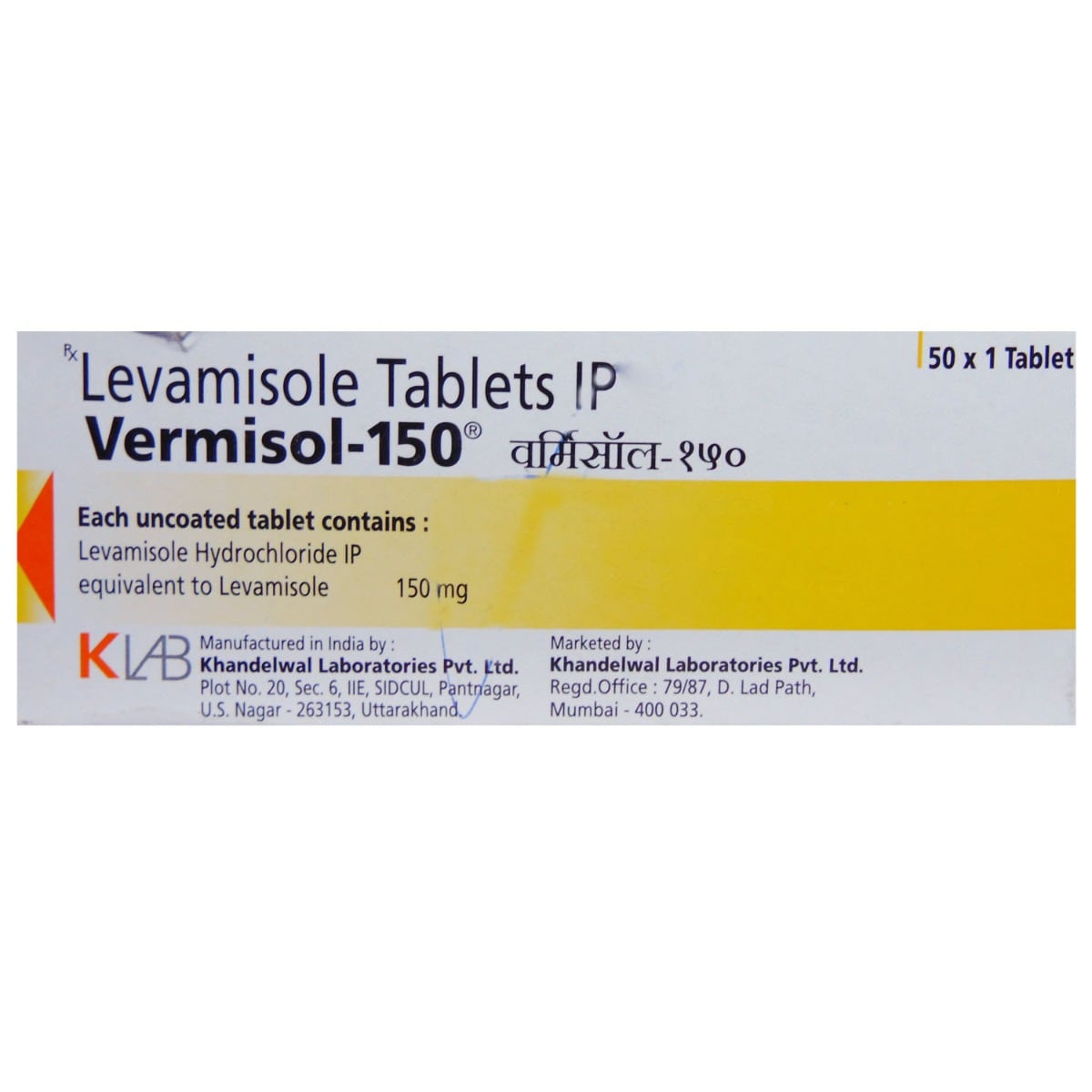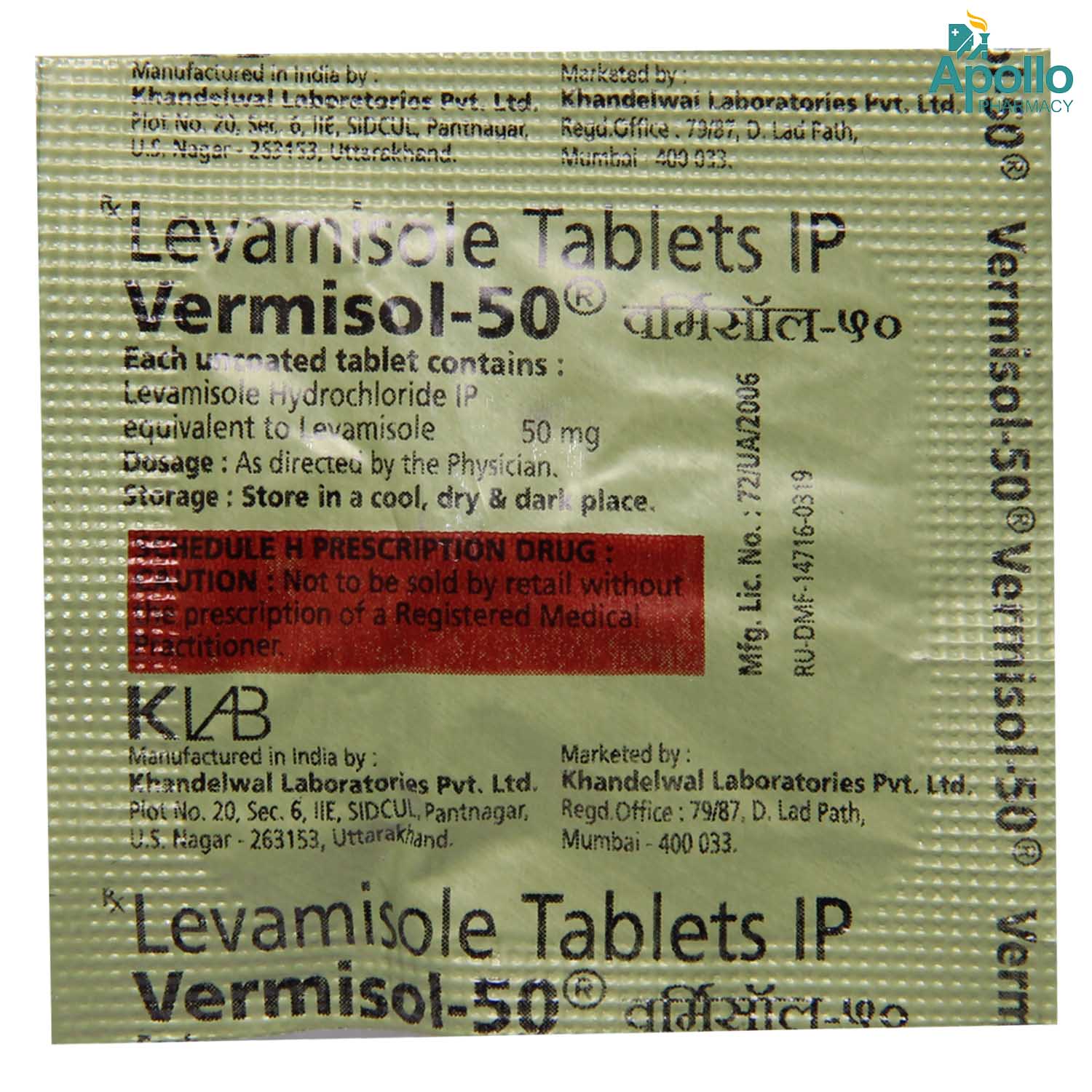Levamisole
About Levamisole
Levamisole belongs to a class 'anti-parasitic', primarily used for the treatment of roundworm and hookworm infections. Roundworms are parasites that live in your intestine and cause ascariasis (an infection of the small intestine caused by Ascaris lumbricoides, which is a species of roundworm). It also causes infection in the lungs. Hookworms are parasites; they live on other living things and cause ancylostomiasis (an infection of the small intestine caused by ancylostoma, a hookworm species), and it also causes infection in the lungs and skin.
Levamisole is composed of 'levamisole'. It works by suppressing the enzyme activity in the worm's muscle; this leads to paralysis and death. In this way, it kills worms and treats your infection.
You are advised to take Levamisole for as long as your doctor has prescribed it for you, depending upon your medical condition. The most common side effects of a Levamisole include headache, dizziness, vomiting, nausea, and abdominal pain. These side effects resolve on their own. However, if the side effects are persistent, stop the medicine and consult your doctor immediately.
Before starting Levamisole inform your doctor if you are allergic to Levamisole or any other medications. Inform your doctor if you are taking any prescription or nonprescription medications, herbal or dietary supplements. Use the Levamisole as advised by your doctor. Tell your doctor if you are pregnant or planning to get pregnant or breastfeeding. Do not recommend the Levamisole to kidney disease, liver disease and pre-existing blood disorders.
Uses of Levamisole
Medicinal Benefits
Levamisole is composed of 'levamisole' belonging to a class 'anti-parasitic', primarily used for treating roundworm and hookworm infections. It works by suppressing the enzyme activity in the worm's muscle; this leads to paralysis and death. In this way, it kills worms and treats your infection. Levamisole is also used in the treatment of mixed ascariasis hookworm infections. It is also used in colon cancer in combination with cancer medicine to work effectively against colon cancer.
Directions for Use
Storage
Side Effects of Levamisole
- Vomiting
- Headache
- Dizziness
- Nausea
- Abdominal pain
- Mouth sores
- Loss of appetite
- Stomach pain
- Change in taste and smell
- Muscle aches
- Fatigue
- Skin rash
Drug Warnings
Before starting Levamisole inform your doctor if you are allergic to Levamisole or any other medications. Inform your doctor if you are taking any prescription or nonprescription medications, herbal or dietary supplements. Use the Levamisole as advised by your doctor. Tell your doctor if you are pregnant or planning to get pregnant or breastfeeding. Do not recommend the Levamisole to kidney disease, liver disease and pre-existing blood disorders. This Levamisole should be used with caution in patients with a history of liver diseases, kidney diseases due to the increased risk of severe adverse effects. Levamisole is also not recommended in rheumatoid arthritis. Caution should be taken while using Levamisole in Sjogren's syndrome ( disorder of your immune system identified by its two most common symptoms — dry eyes and a dry mouth).
Drug Interactions
Drug-Drug Interactions: Levamisole may interact with anti-helminthics (albendazole, ivermectin),anti-cancer drugs (doxifluridine, capecitibine), antiepileptic drugs (phenytoin) and anti-coagulants (heparin, warfarin).
Drug-Food Interactions: Levamisole may interact with alcohol.
Drug-Disease Interactions: Levamisole should be used with caution in patients with kidney problems, liver problems, rheumatoid arthritis and Sjogren's syndrome.
Drug-Drug Interactions Checker List:
Safety Advice

Alcohol
unsafeLevamisole is not recommended with the consumption of alcohol while receiving this medicine since it may increase the risk of adverse effects such as severe headaches, nausea, vomiting, dizziness, etc.

Pregnancy
cautionLevamisole is not recommended for use in pregnant women unless absolutely necessary. All the risks and benefits should be discussed with the doctor before taking this medicine. Your doctor may prescribe a suitable alternative based on your clinical condition.

Breast Feeding
cautionLevamisole is not recommended for use in breastfeeding women unless absolutely necessary. All the risks and benefits should be discussed with the doctor before taking this medicine. Your doctor may prescribe a suitable alternative based on your clinical condition

Driving
cautionUse of this may cause symptoms such as dizziness, sleepiness, etc., in some patients. It is advised that you do not perform any activities such as driving a vehicle or operating machinery if you experience any of these symptoms.

Liver
cautionLevamisole should be used with caution in patients with a history of liver diseases due to the increased risk of severe adverse effects. Regular monitoring of liver function tests, appropriate dose adjustments or replacement with a suitable alternative may be required in some cases based on the clinical condition of the patient.

Kidney
cautionLevamisole should be used with caution in patients with a history of kidney diseases due to the increased risk of severe adverse effects. Regular monitoring of kidney function tests, appropriate dose adjustments or replacement with a suitable alternative may be required in some cases based on the clinical condition of the patient.

Children
cautionLevamisole should be prescribed by the advice of your doctor. Because dose adjustments were done based on the height and weight of the child.
Habit Forming
Diet & Lifestyle Advise
Wash your hands with soap and water before handling food.
Teach children the importance of washing hands to prevent infection.
Wash, peel or cook all raw vegetables and fruits before eating, particularly those that have been grown in soil that has been fertilized with manure.
Take milk, papaya, nuts, oats, eggs into your regular diet.
Eat berries, fish, veggies.
Avoid oily food and spicy foods.
Special Advise
Do not skip doses and finish the prescribed course, even if you start to feel better. Stopping it early may increase your risk of further infection.
Avoid being near people who are sick or have infections. Inform your doctor if you develop signs of infection.
Monitor your blood counts and liver function before you start taking this medicine and regularly throughout your treatment.
Patients Concern
Disease/Condition Glossary
Roundworms: Roundworms are parasites that live in your intestine. They are contagious through contact with the infected stool of people or animals. Roundworms can also be contracted by contact with infected surfaces (usually soil and dirt). It causes ascariasis, a small intestine infection caused by Ascaris lumbricoides, a roundworm species. Mostly, it is transmitted through poor hygiene. It is usually found in human faeces and is transmitted from hand to mouth. Symptoms include live worm in your stool, wheezing, cough, fever, severe abdominal pain, vomiting, restlessness, disturbed sleep, weight loss, and loss of appetite. Sometimes, it also affects the lungs; symptoms include coughing, wheezing, chest discomfort, fever and blood in the mucus.
Hookworms: Hookworms are parasites. This means they live on other living things. Hookworms affect your lungs, skin, and small intestine. Hookworm causes ancylostomiasis, an infection of the small intestine that is caused by Ancylostoma hookworm. Hookworm is passed by human faeces onto the ground. It is transmitted by walking barefoot on contaminated soil or by the ingestion of contaminated food/by directly passing through the skin. Symptoms include diarrhoea, barely noticeable abdominal pain, intestinal cramps, colic, nausea and serious anaemia. People in good health may not have any symptoms at all.
Mixed Ascariasis-Hookworm infections: There are mixed infections caused by Ascaris lumbricoides (giant roundworms) and hookworms.
FAQs
Levamisole is used for the treatment of roundworm and hookworm infections.
Levamisole works by suppressing the enzyme activity in the worm's muscle because of this it leads to paralysis and death. In this way, it kills worms and treats your infection.
No, you should not stop taking Levamisole by yourself even if you feel better, take the advice of your doctor before stopping Levamisole. Because there may be a chance of reoccurrence of infection.
If you forget a dose of Levamisole, take it as soon as you remember. However, if it is almost time for your next dose, skip the missed dose and take the next scheduled dose at the prescribed time. Do not double the dose to make up for the missed one as this may increase the chances of developing side effects.
Levamisole may make you feel dizzy. Avoid driving, operating on machinery, working at heights or participating in potentially dangerous activities, especially during the initial days of your treatment. However, if your condition does not improve, consult your doctor.
You are advised to take Levamisole for as long as your doctor has prescribed it for you depending upon your medical condition.
No, Levamisole is not an antibiotic; It is an anti-parasitic drug, primarily used for the treatment of roundworm and hookworm infection.
Yes, Levamisole is effective when taken in the dose and duration as advised by your doctor.
You should avoid Levamisole if you are allergic to its components. Inform the doctor if you have kidney disease, liver disease, pre-existing blood disorders or rheumatoid arthritis.
Store Levamisole in a cool and dry place away from sunlight. Keep it out of sight and reach of children.
Yes, Levamisole is safe but it is important to consult your doctor before taking it.
The most common side effects of Levamisole include headache, dizziness, vomiting, nausea, and abdominal pain. Consult the doctor if any of these side effects persist or worsen.









